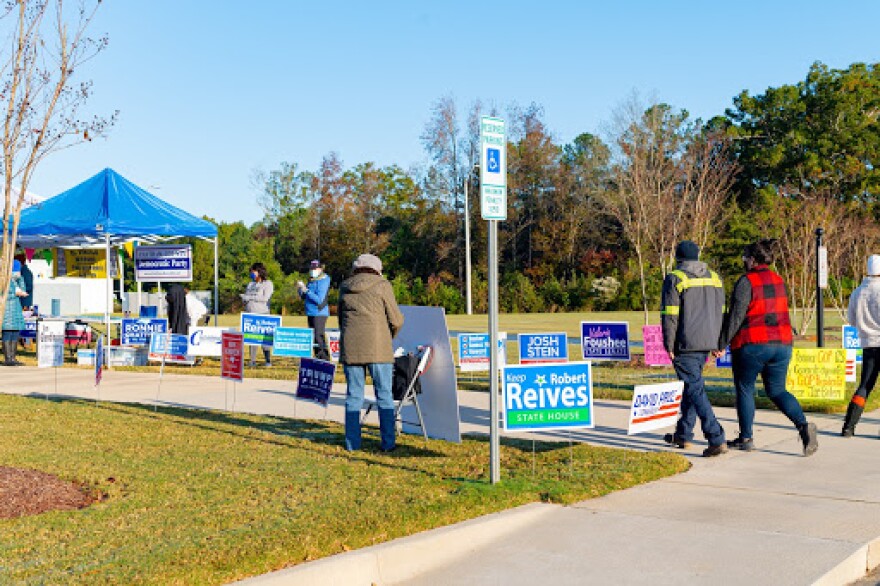Travis Richardson has been politically engaged for as long as he can remember. As a high school student, he organized a walk-out over racial injustice.
"And I thought I was going to get suspended; my principal actually was very happy with us for, like, being active and using our voices and platforms."
Then, in 2017, when Richardson entered North Carolina A&T State University as a freshman, he immediately registered to vote.
"And I've voted in every election, local, midterm presidential ever since," he said.

So, when Richardson recently found out he was on a list of voters who needed to fix their registration, it came as a surprise.
"I found it odd," Richardson said, because he had just voted in last year's presidential contest and the other races on the 2024 midterm ballot.
Until recently, Richardson had been on a list of North Carolina voters identified by the state elections board as needing to clear up their registration records.
The state elections board's Registration Repair Project grew out of a citizen complaint filed in 2023 that revealed a problem with North Carolina's voter registration form. The form violated the federal Help America Vote Act because it didn't make it clear a registrant had to provide a driver's license number or the last four digits of their Social Security Number.
At the time, the state elections board — then with a Democratic majority — fixed the registration form but determined it did not need to take any remedial steps to repair registration records missing one of the required numbers. After all, these voters' eligibility would have been confirmed in subsequent elections, especially with a photo ID requirement now in effect.
Still, from 2004 when HAVA took effect until last year, tens of thousands of voters registered without providing one of the required numbers.
"We simply have no choice in the matter," said Sam Hayes, executive director of the North Carolina State Board of Elections. "This is what the law commands."
Hayes, who previously served as general counsel to two Republican speakers of the state House, was installed as executive director this spring after a GOP-backed law went into effect giving Republicans control over state elections administration. In multiple lawsuits last year, including ones challenging the outcome of a state Supreme Court race between Republican Jefferson Griffin and Democrat Allison Riggs, the GOP sought to exploit the registration issue to disqualify voters.
Launching the Registration Repair Project was a top priority for Hayes and the initiative got unanimous approval from the bipartisan state elections board.
"We've been very careful in our messaging to let folks know that their vote is not at risk," Hayes said.
The repair list started with roughly 103,000 voters on it. Internal reviews by state and local elections officials cut that number down by more than 10,000 voters just by finding numbers that had fallen through the administrative cracks.
For voters remaining on the list, now below 80,000, the state elections board recently started sending out mailers urging them to help correct their records. And those voters now have been designated inactive.
That means unless they fix the issue prior to showing up to vote, they'll have to cast a provisional ballot. Sam Hayes said that's not a big deal, though it could necessitate additional steps from the voter to get the ballot validated.
"That is just a flag that we have in our system that tells us we need to capture this information," Hayes said of the inactive designation.
According to an analysis by Chris Cooper, a political science professor at Western Carolina University, the voters on the repair list skew younger than the state's average voter, 39 versus 51 years old, and are harder to reach.
"They're younger, they move around more often, they don't have mortgages," Cooper said. "They're not settled in a certain place, they're less likely to be contacted by the parties."
And the registration repair list could have a disparate impact on Black voters, warned Adrianne Spoto, voting rights counsel with the Southern Coalition for Social Justice.
According to an analysis by SCSJ's partner organization, Blueprint NC, Black voters account for more than 41% of the people on the repair list while making up just 21.5% of the state's registered voters.
"It's putting up obstacles for voters," Spoto said.
Travis Richardson found out he was on the registration repair list because his mother is friends with a county elections official. But Richardson said he thinks other young people on the list might not be so lucky; they might miss the mailer because they tend to move around a lot.
"It's just, 'Uh, lease is up, I don't want to stay here anymore because the rent went up,'" Richardson said, adding that he knows people his age who move every nine months or so.



